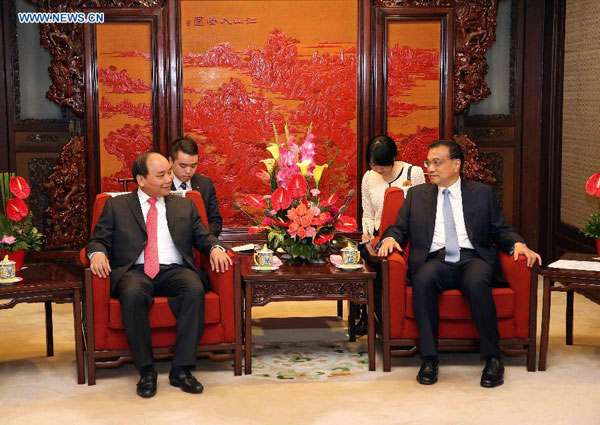 |
|
Chinese Premier Li Keqiang (R) meets with Vietnamese Deputy Prime Minister Nguyen Xuan Phuc in Beijing, Sept 16, 2015.[Photo/Xinhua] |
President Xi Jinping will visit Vietnam and Singapore from Thursday to Saturday amid diplomatic tensions over US guided-missile destroyer USS Lassen's entry into the waters around China's Zhubi Reef in the South China Sea on Oct 27.
This makes Xi's itinerary of special significance to regional stability, especially because some Association of Southeast Asian Nations member states, including Vietnam, still have maritime territorial disputes with China, and Singapore is the "brain" of the 10-nation regional body.
China and Vietnam had a very friendly relationship until the late 1970s, when they fell out over border disputes. Their sovereignty-related dispute in the South China Sea in recent years has dealt a further blow to bilateral relations, which in the eyes of many Western media outlets, is a sign of waning mutual trust.
Over the past two decades or so, however, the leader-to-leader and party-to-party diplomacy has played a key role in balancing the China-Vietnam relationship, as well as defusing bilateral tensions. Although their overall relationship is not ideal, the high-level bilateral exchanges are expected to create a favorable atmosphere for Xi's visit to Vietnam, especially because it comes just six months after Communist Party of Vietnam General Secretary Nguyen Phu Trong visited China.
The two socialist neighbors have a lot in common with regard to their shared interests and pursuit of development according to their national conditions. To achieve prosperity, and improve people's livelihood and good governance, China and Vietnam both have resorted to a series of comprehensive reforms. In this area, China, as a front-runner, has valuable lessons to share with Vietnam.
Their similar stances on democracy and human rights issues, which have often come under criticism from some Western countries, are part of the shared interests. The need to thwart the West-led intervention in their domestic affairs is also likely to bolster bilateral interactions, especially between their security and defense departments.
China and Vietnam have cooperated closely in the training of military personnel, and established a joint patrolling mechanism in the Beibu Gulf. They are expected to deepen coordination in fighting nontraditional security threats such as regional terrorism, human trafficking, and drug and weapon smuggling.
As China's neighborhood diplomacy enters a transitory phase, it will have to readjust its ties with neighboring countries like Vietnam, which is also recalibrating its multilateral diplomacy to strike the balance with major powers-China, the US, Japan, Russia and the European Union. It is therefore vital for the Chinese and Vietnamese governments to better manage and control their disagreements without being influenced by third parties.
Singapore, the other destination of Xi's visit, is a leading upholder of the balanced major power diplomacy and has played a unique role in regional affairs. Its successful governance, in particular, has served as a role model for China's reform and opening-up, which were launched more than three decades ago.
China and Singapore and their top leaders have maintained a healthy relationship for years despite the stark contrast in their size and population. In general, Singapore is willing to see China's rise and at the same time is worried about the possible uncertainty that comes with it. It hopes an equilibrium would be reached between major players, including Beijing, Washington and Tokyo, to stabilize regional affairs, in which the ASEAN could have a bigger say.
The Beijing-led Silk Road Economic Belt and 21st Century Maritime Silk Road are in need of concerted participation of Southeast Asian states, among which Singapore and Vietnam have expressed their willingness to join. Their membership in the Trans-Pacific Partnership Agreement, though, poses a challenge. And that requires China work harder to alleviate its neighbors' concerns and convince them with more cooperative proposals.
The author is a researcher at the National Institute of International Strategy at the Chinese Academy of Social Sciences.

I’ve lived in China for quite a considerable time including my graduate school years, travelled and worked in a few cities and still choose my destination taking into consideration the density of smog or PM2.5 particulate matter in the region.